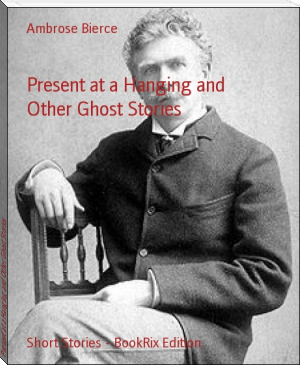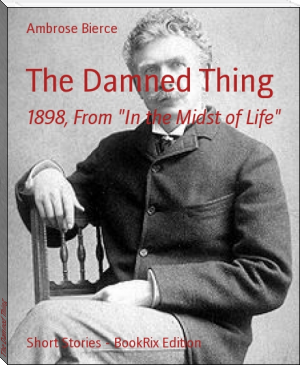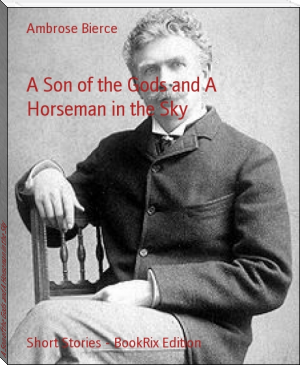Present at a Hanging and Other Ghost Stories - Ambrose Bierce (bookstand for reading .TXT) 📗

- Author: Ambrose Bierce
Book online «Present at a Hanging and Other Ghost Stories - Ambrose Bierce (bookstand for reading .TXT) 📗». Author Ambrose Bierce
"Dunning has had the fight of his life," thought the major, and was about to ride forward. Dunning raised his hand, motioning him back with a gesture of warning; then, lowering the arm, he pointed to the place where the road lost itself in the blackness of the cedar forest.
The major understood, and turning his horse rode back to the little group that had followed him and was already moving to the rear in fear of his displeasure, and so returned to the head of his command.
"Dunning is just ahead there," he said to the captain of his leading company. "He has killed his man and will have something to report."
Right patiently they waited, sabers drawn, but Dunning did not come. In an hour the day broke and the whole force moved cautiously forward, its commander not altogether satisfied with his faith in Private Dunning. The expedition had failed, but something remained to be done.
In the little open space off the road they found the fallen horse. At a right angle across the animal's neck face upward, a bullet in the brain, lay the body of Trooper Dunning, stiff as a statue, hours dead.
Examination disclosed abundant evidence that within a half-hour the cedar forest had been occupied by a strong force of Confederate infantry--an ambuscade.
TWO MILITARY EXECUTIONS
In the spring of the year 1862 General Buell's big army lay in camp, licking itself into shape for the campaign which resulted in the victory at Shiloh. It was a raw, untrained army, although some of its fractions had seen hard enough service, with a good deal of fighting, in the mountains of Western Virginia, and in Kentucky. The war was young and soldiering a new industry, imperfectly understood by the young American of the period, who found some features of it not altogether to his liking. Chief among these was that essential part of discipline, subordination. To one imbued from infancy with the fascinating fallacy that all men are born equal, unquestioning submission to authority is not easily mastered, and the American volunteer soldier in his "green and salad days" is among the worst known. That is how it happened that one of Buell's men, Private Bennett Story Greene, committed the indiscretion of striking his officer. Later in the war he would not have done that; like Sir Andrew Aguecheek, he would have "seen him damned" first. But time for reformation of his military manners was denied him: he was promptly arrested on complaint of the officer, tried by court- martial and sentenced to be shot.
"You might have thrashed me and let it go at that," said the condemned man to the complaining witness; "that is what you used to do at school, when you were plain Will Dudley and I was as good as you. Nobody saw me strike you; discipline would not have suffered much."
"Ben Greene, I guess you are right about that," said the lieutenant. "Will you forgive me? That is what I came to see you about."
There was no reply, and an officer putting his head in at the door of the guard-tent where the conversation had occurred, explained that the time allowed for the interview had expired. The next morning, when in the presence of the whole brigade Private Greene was shot to death by a squad of his comrades, Lieutenant Dudley turned his back upon the sorry performance and muttered a prayer for mercy, in which himself was included.
A few weeks afterward, as Buell's leading division was being ferried over the Tennessee River to assist in succoring Grant's beaten army, night was coming on, black and stormy. Through the wreck of battle the division moved, inch by inch, in the direction of the enemy, who had withdrawn a little to reform his lines. But for the lightning the darkness was absolute. Never for a moment did it cease, and ever when the thunder did not crack and roar were heard the moans of the wounded among whom the men felt their way with their feet, and upon whom they stumbled in the gloom. The dead were there, too-- there were dead a-plenty.
In the first faint gray of the morning, when the swarming advance had paused to resume something of definition as a line of battle, and skirmishers had been thrown forward, word was passed along to call the roll. The first sergeant of Lieutenant Dudley's company stepped to the front and began to name the men in alphabetical order. He had no written roll, but a good memory. The men answered to their names as he ran down the alphabet to G.
"Gorham."
"Here!"
"Grayrock."
"Here!"
The sergeant's good memory was affected by habit:
"Greene."
"Here!"
The response was clear, distinct, unmistakable!
A sudden movement, an agitation of the entire company front, as from an electric shock, attested the startling character of the incident. The sergeant paled and paused. The captain strode quickly to his side and said sharply:
"Call that name again."
Apparently the Society for Psychical Research is not first in the field of curiosity concerning the Unknown.
"Bennett Greene."
"Here!"
All faces turned in the direction of the familiar voice; the two men between whom in the order of stature Greene had commonly stood in line turned and squarely confronted each other.
"Once more," commanded the inexorable investigator, and once more came--a trifle tremulously--the name of the dead man:
"Bennett Story Greene."
"Here!"
At that instant a single rifle-shot was heard, away to the front, beyond the skirmish-line, followed, almost attended, by the savage hiss of an approaching bullet which passing through the line, struck audibly, punctuating as with a full stop the captain's exclamation, "What the devil does it mean?"
Lieutenant Dudley pushed through the ranks from his place in the rear.
"It means this," he said, throwing open his coat and displaying a visibly broadening stain of crimson on his breast. His knees gave way; he fell awkwardly and lay dead.
A little later the regiment was ordered out of line to relieve the congested front, and through some misplay in the game of battle was not again under fire. Nor did Bennett Greene, expert in military executions, ever again signify his presence at one.
SOME HAUNTED HOUSES
THE ISLE OF PINES
For many years there lived near the town of Gallipolis, Ohio, an old man named Herman Deluse. Very little was known of his history, for he would neither speak of it himself nor suffer others. It was a common belief among his neighbors that he had been a pirate--if upon any better evidence than his collection of boarding pikes, cutlasses, and ancient flintlock pistols, no one knew. He lived entirely alone in a small house of four rooms, falling rapidly into decay and never repaired further than was required by the weather. It stood on a slight elevation in the midst of a large, stony field overgrown with brambles, and cultivated in patches and only in the most primitive way. It was his only visible property, but could hardly have yielded him a living, simple and few as were his wants. He seemed always to have ready money, and paid cash for all his purchases at the village stores roundabout, seldom buying more than two or three times at the same place until after the lapse of a considerable time. He got no commendation, however, for this equitable distribution of his patronage; people were disposed to regard it as an ineffectual attempt to conceal his possession of so much money. That he had great hoards of ill-gotten gold buried somewhere about his tumble-down dwelling was not reasonably to be doubted by any honest soul conversant with the facts of local tradition and gifted with a sense of the fitness of things.
On the 9th of November, 1867, the old man died; at least his dead body was discovered on the 10th, and physicians testified that death had occurred about twenty-four hours previously--precisely how, they were unable to say; for the post-mortem examination showed every organ to be absolutely healthy, with no indication of disorder or violence. According to them, death must have taken place about noonday, yet the body was found in bed. The verdict of the coroner's jury was that he "came to his death by a visitation of God." The body was buried and the public administrator took charge of the estate.
A rigorous search disclosed nothing more than was already known about the dead man, and much patient excavation here and there about the premises by thoughtful and thrifty neighbors went unrewarded. The administrator locked up the house against the time when the property, real and personal, should be sold by law with a view to defraying, partly, the expenses of the sale.
The night of November 20 was boisterous. A furious gale stormed across the country, scourging it with desolating drifts of sleet. Great trees were torn from the earth and hurled across the roads. So wild a night had never been known in all that region, but toward morning the storm had blown itself out of breath and day dawned bright and clear. At about eight o'clock that morning the Rev. Henry Galbraith, a well-known and highly esteemed Lutheran minister, arrived on foot at his house, a mile and a half from the Deluse place. Mr. Galbraith had been for a month in Cincinnati. He had come up the river in a steamboat, and landing at Gallipolis the previous evening had immediately obtained a horse and buggy and set out for home. The violence of the storm had delayed him over night, and in the morning the fallen trees had compelled him to abandon his conveyance and continue his journey afoot.
"But where did you pass the night?" inquired his wife, after he had briefly related his adventure.
"With old Deluse at the 'Isle of Pines,'" {1} was the laughing reply; "and a glum enough time I had of it. He made no objection to my remaining, but not a word could I get out of him."
Fortunately for the interests of truth there was present at this conversation Mr. Robert Mosely Maren, a lawyer and litterateur of Columbus, the same who wrote the delightful "Mellowcraft Papers." Noting, but apparently not sharing, the astonishment caused by Mr. Galbraith's answer this ready-witted person checked by a gesture the exclamations that would naturally have followed, and tranquilly inquired: "How came you to go in there?"
This is Mr. Maren's version of Mr. Galbraith's reply:
"I saw a light moving about the house, and being nearly blinded by the sleet, and half frozen besides, drove in at the gate and put up my horse in the old rail stable, where it is now. I then rapped at the door, and getting no invitation went in without one. The room was dark, but having matches I found a candle and lit it. I tried to enter the adjoining room, but the door was fast, and although I heard the old man's heavy footsteps in there he made no response to my calls. There was no fire on the hearth, so I made one and laying [sic] down before it with my overcoat under my head, prepared myself for sleep.





Comments (0)